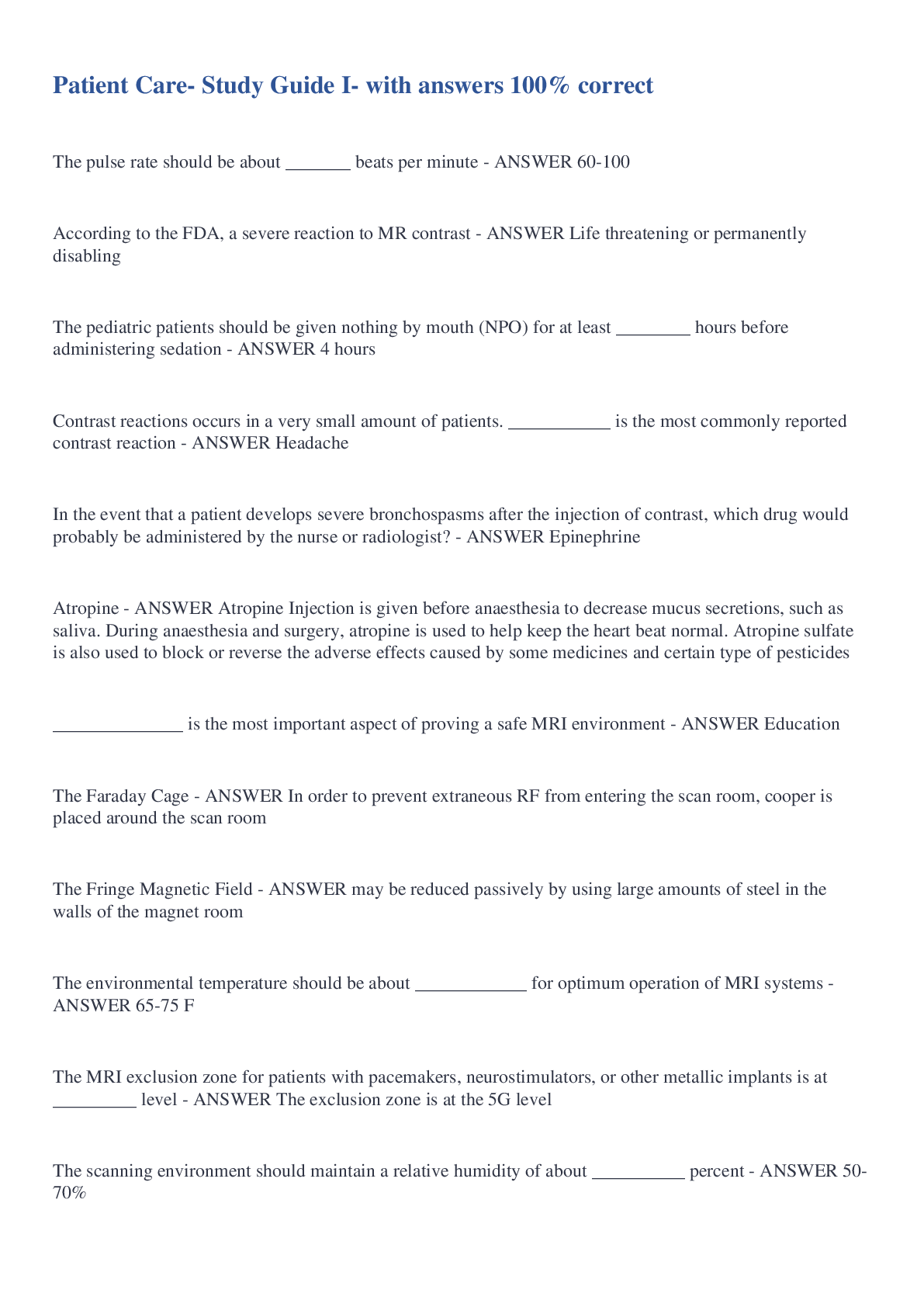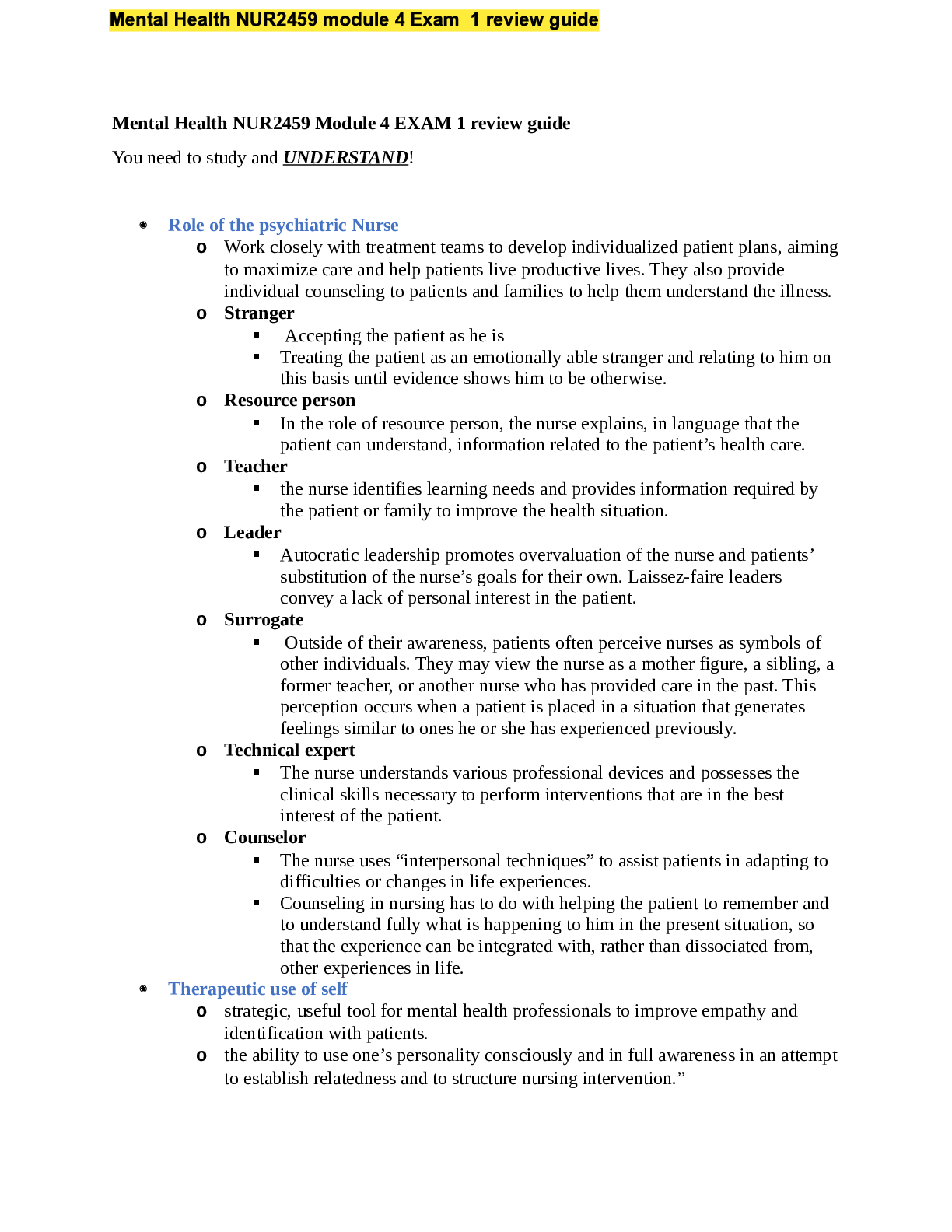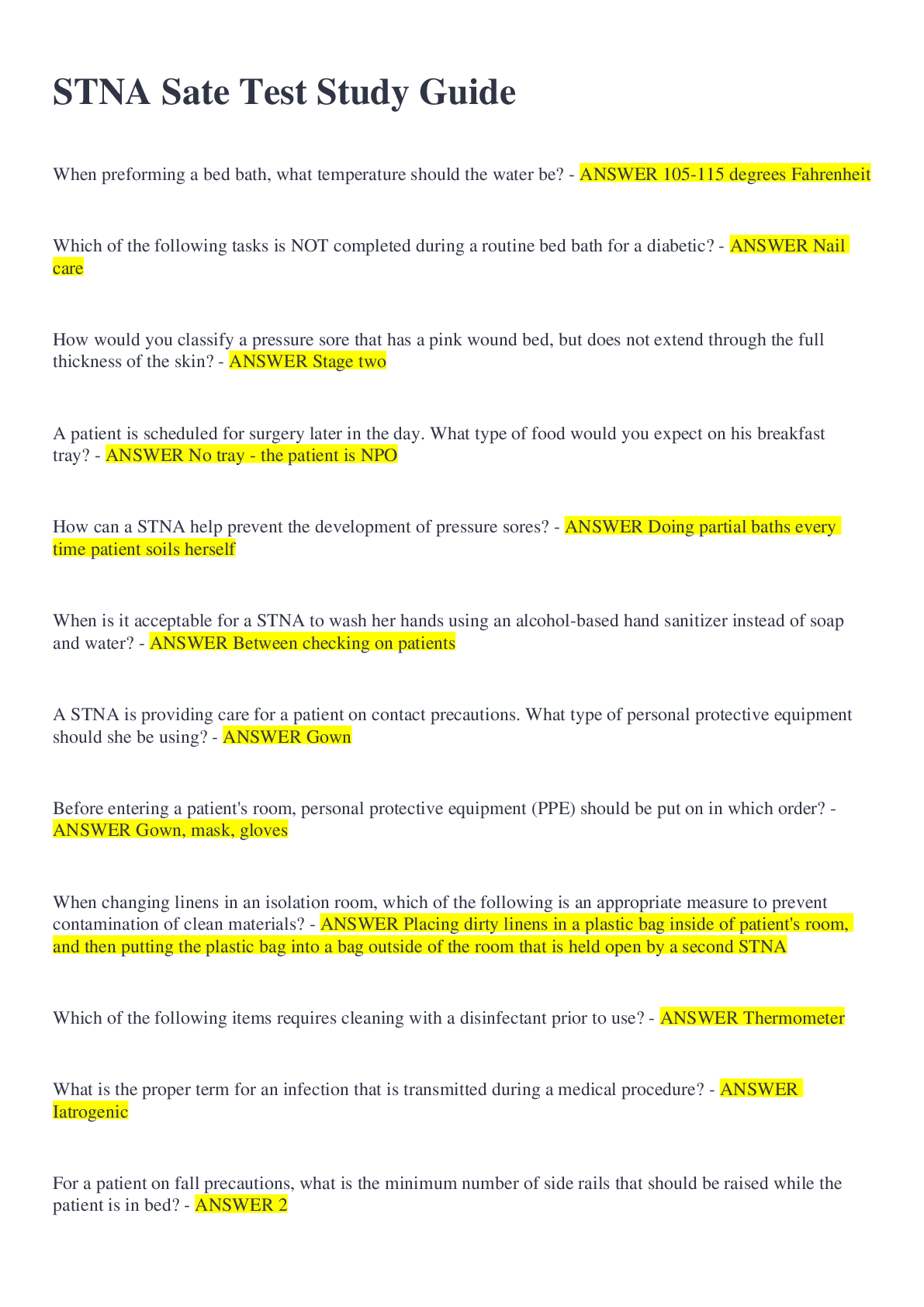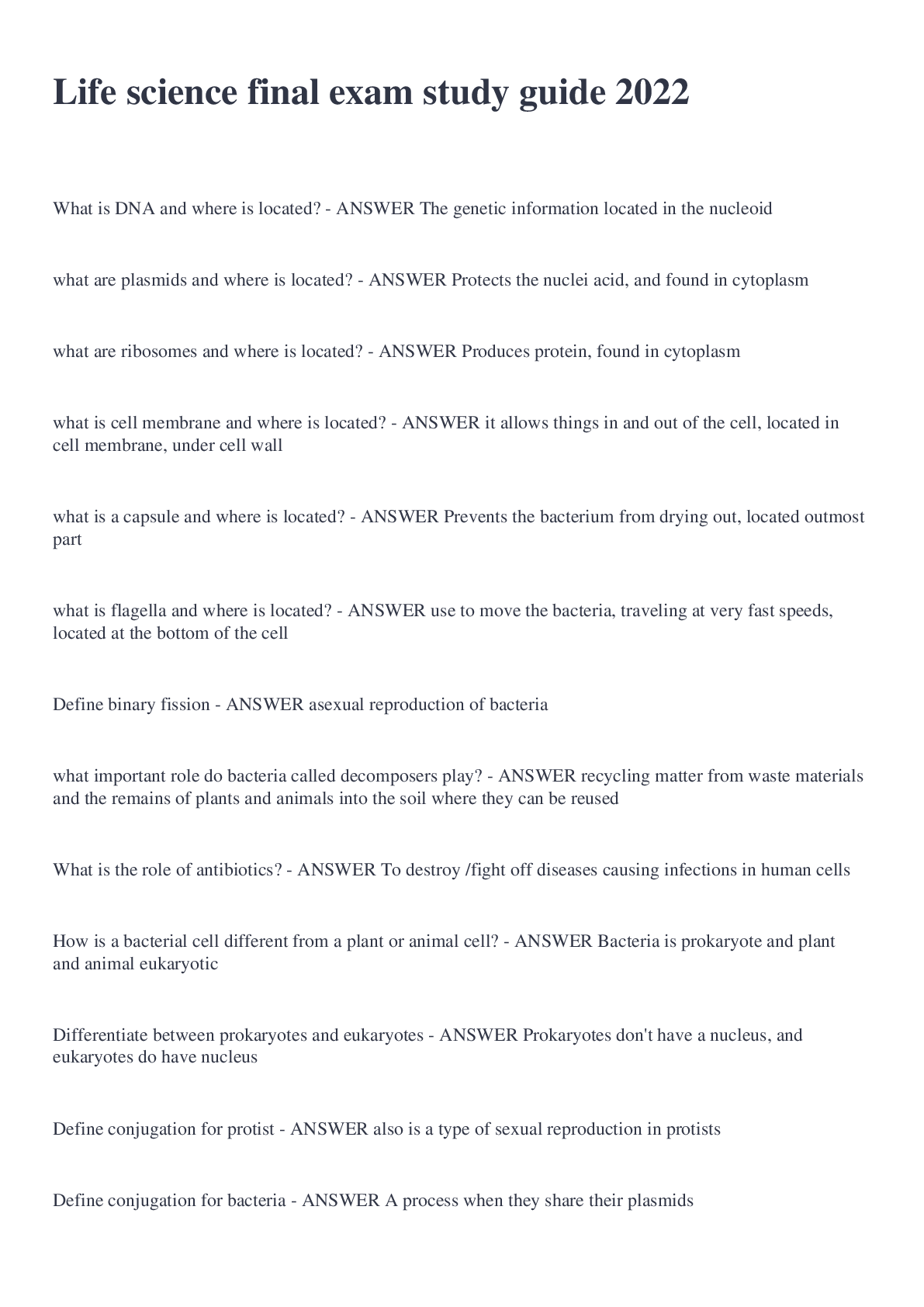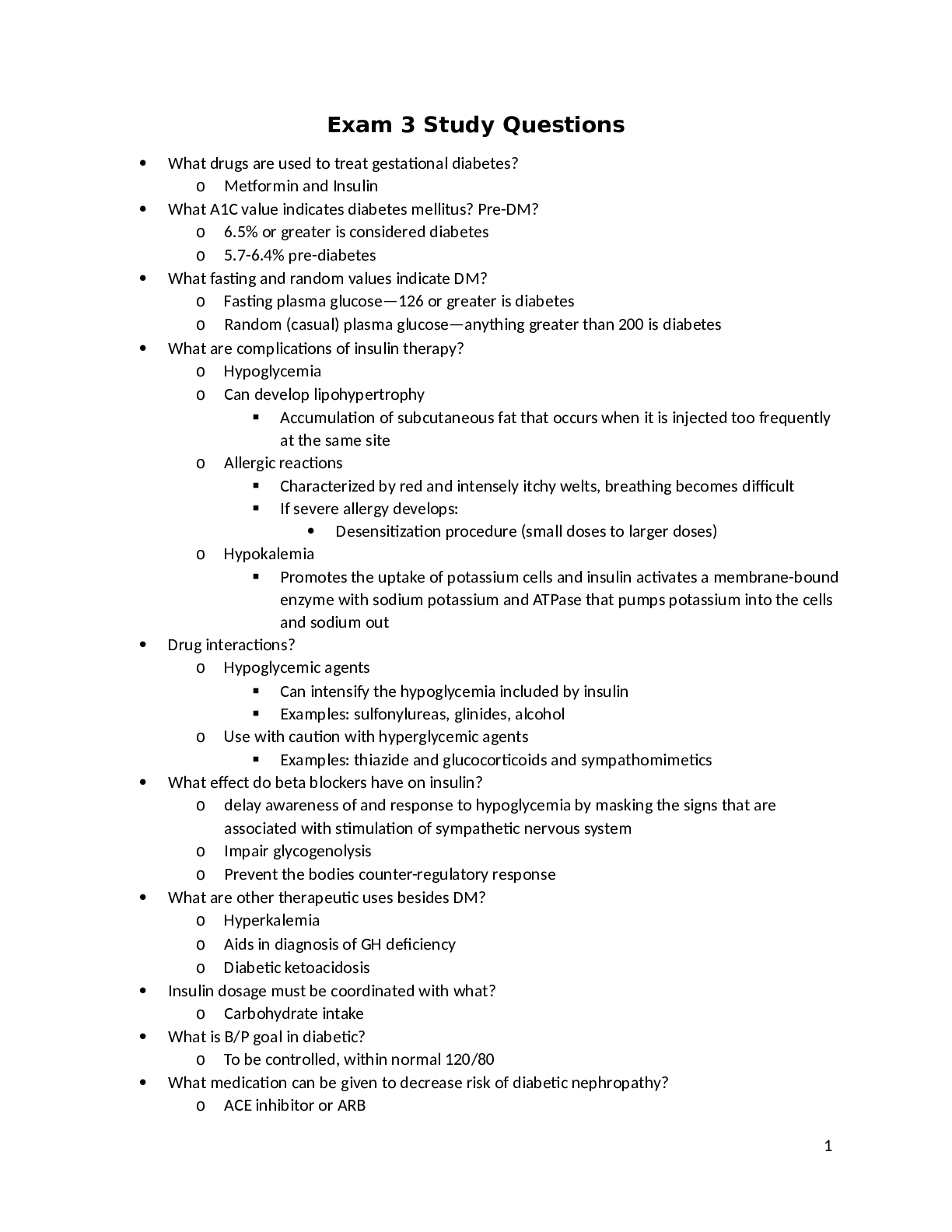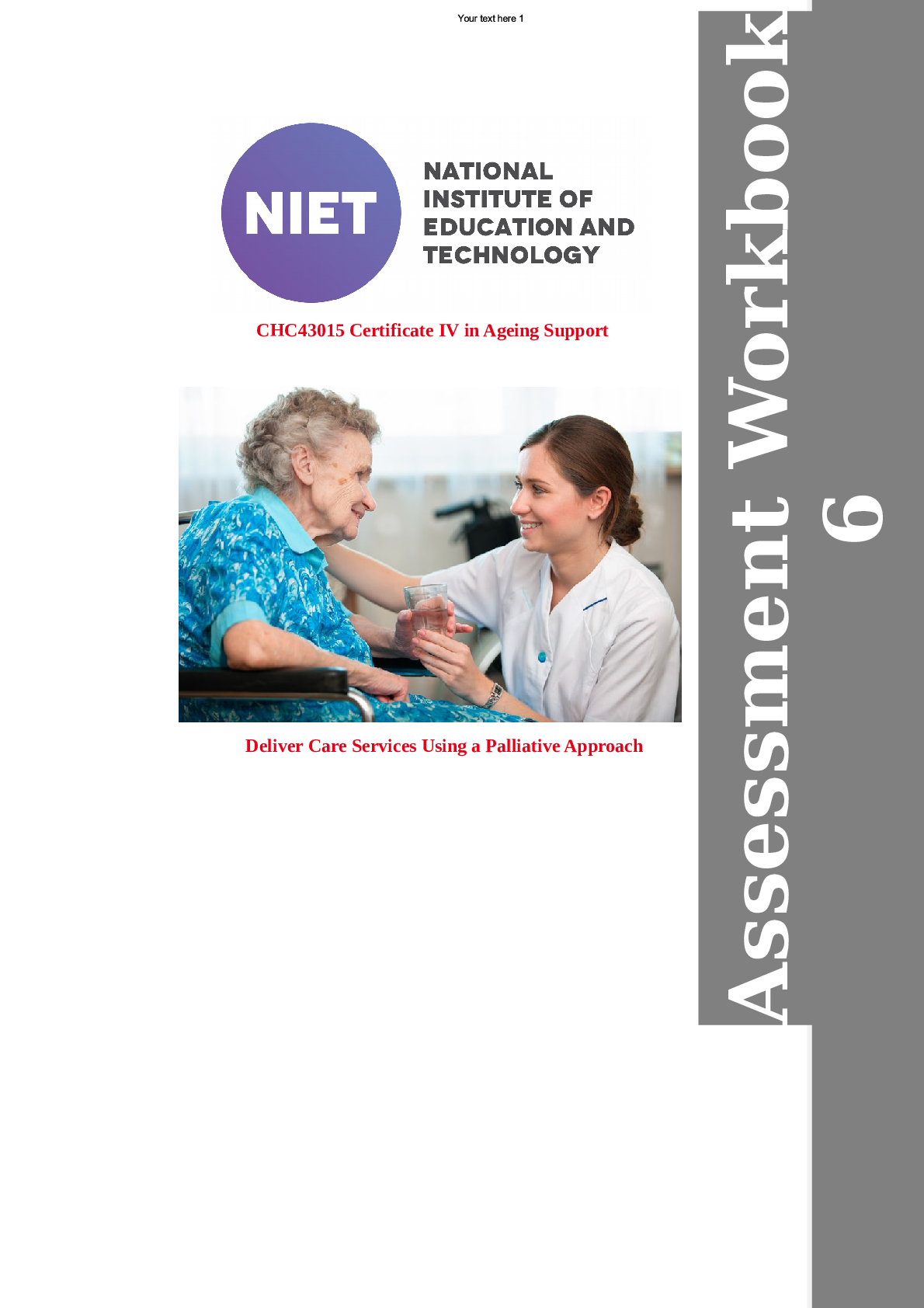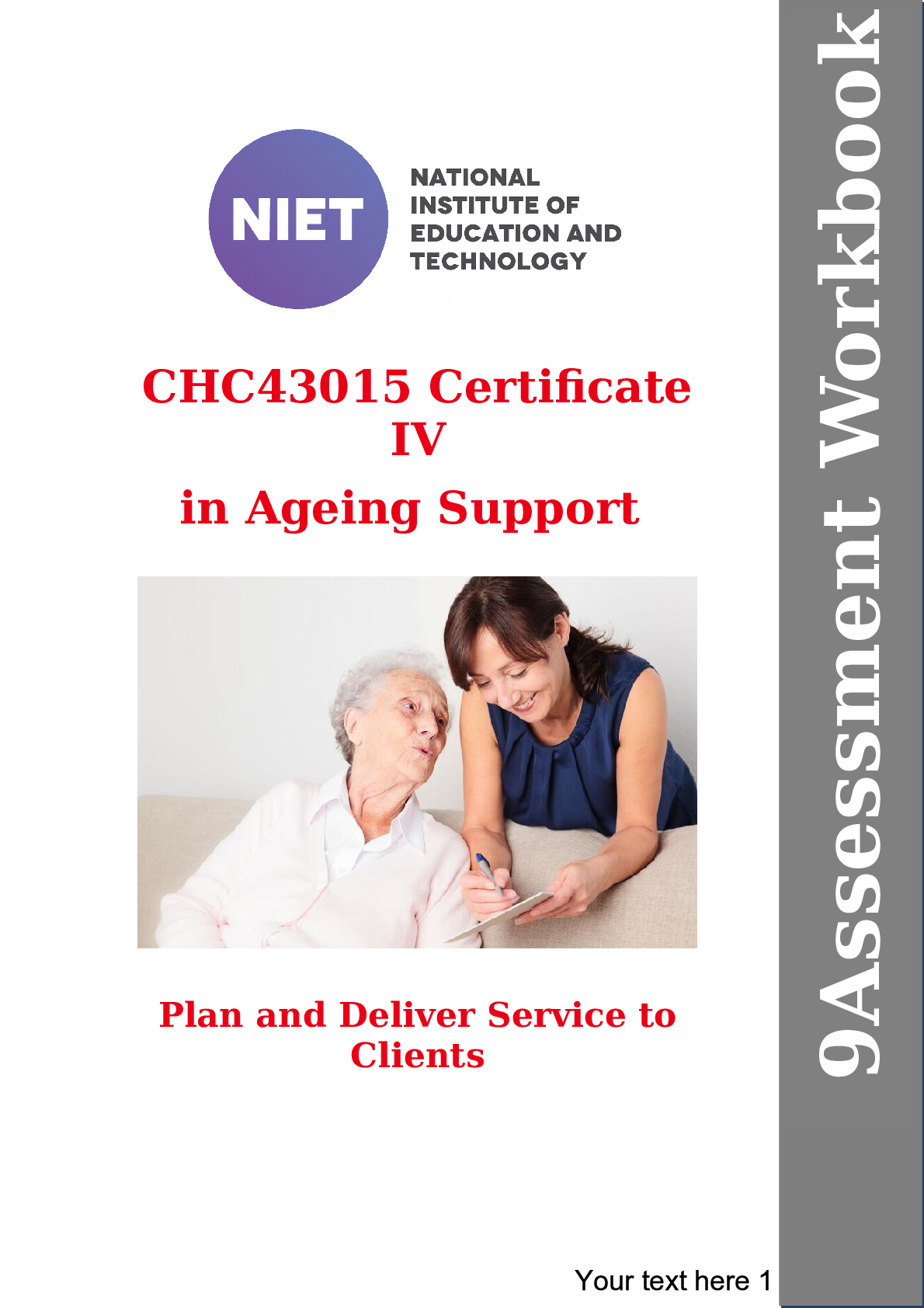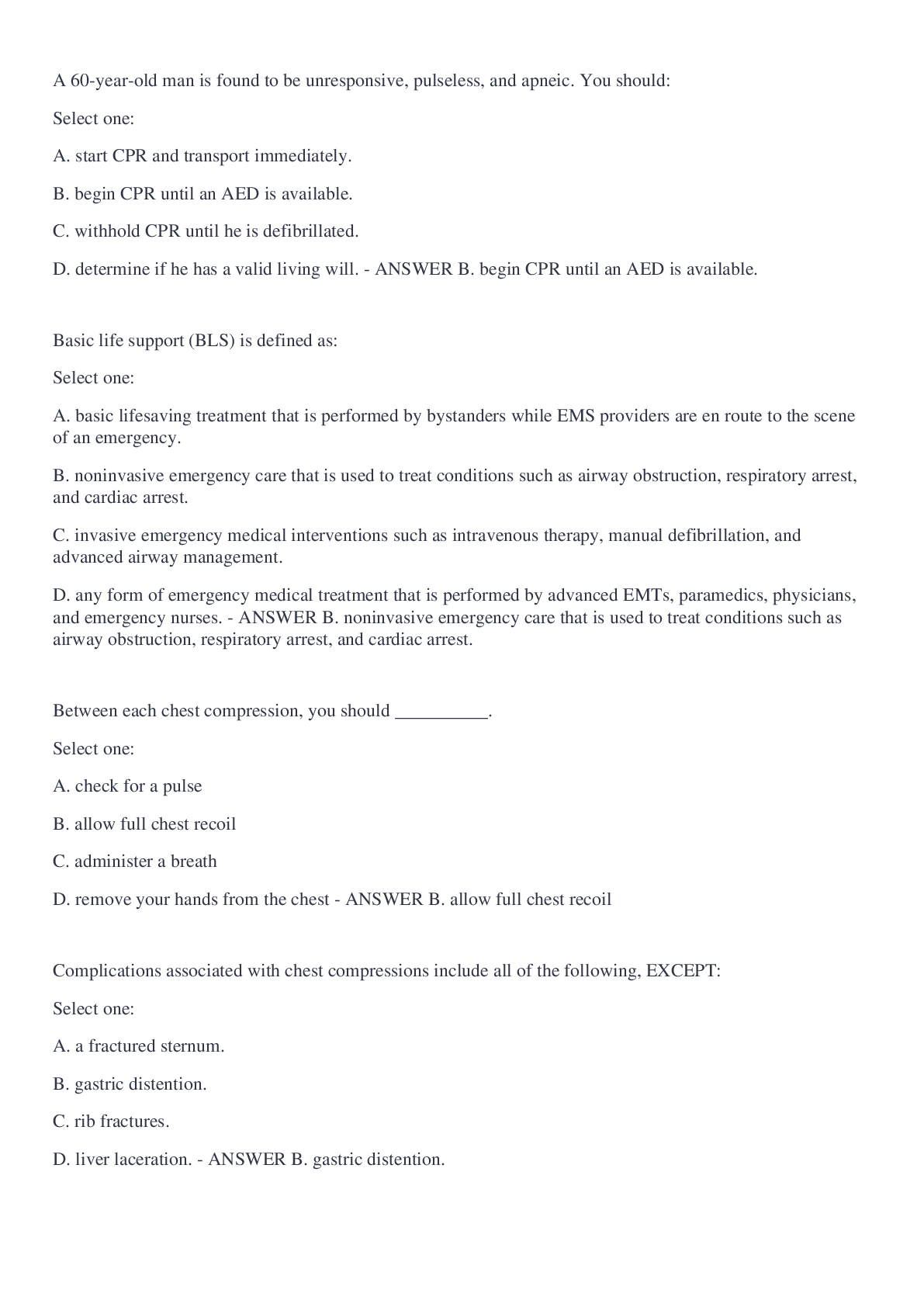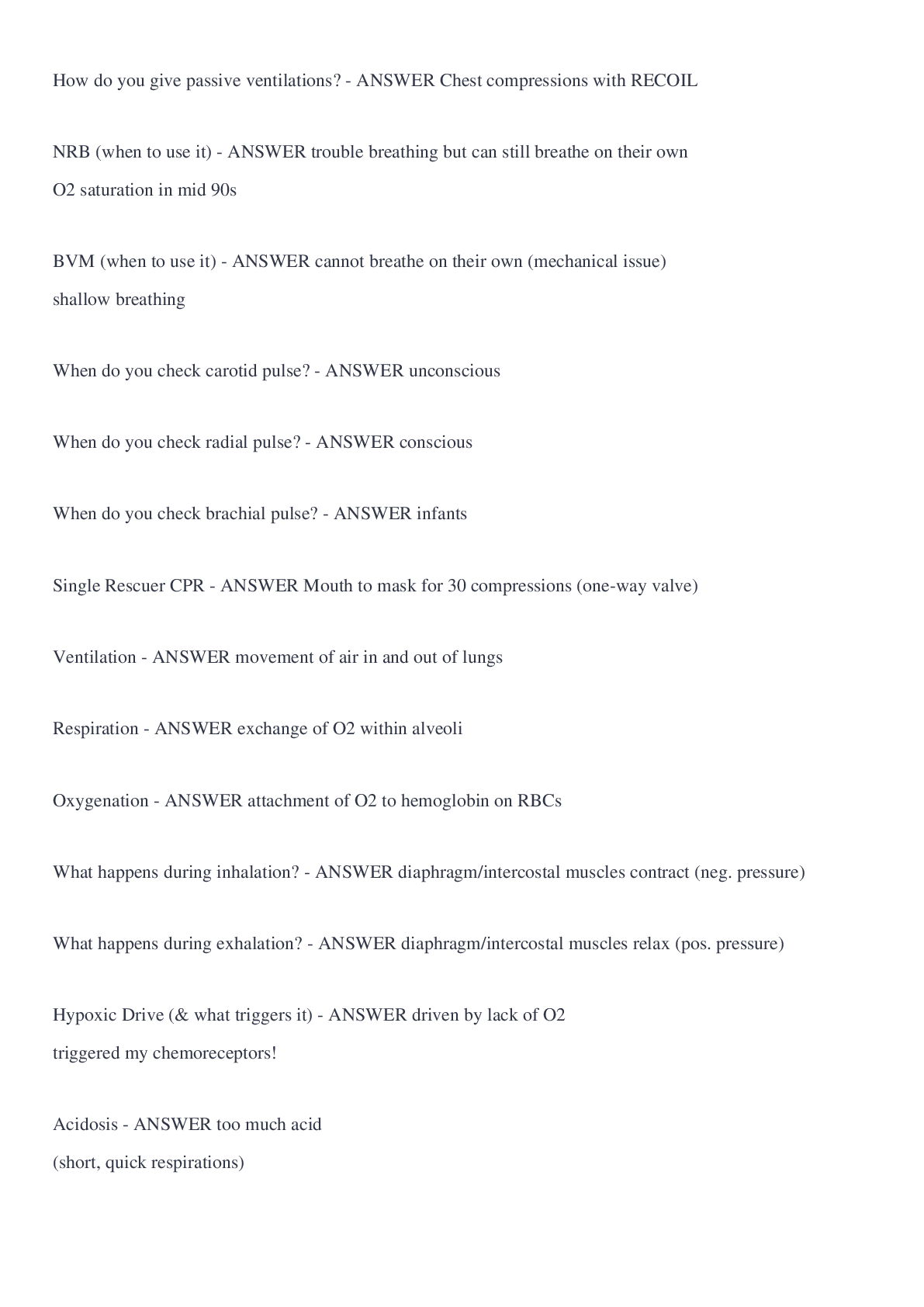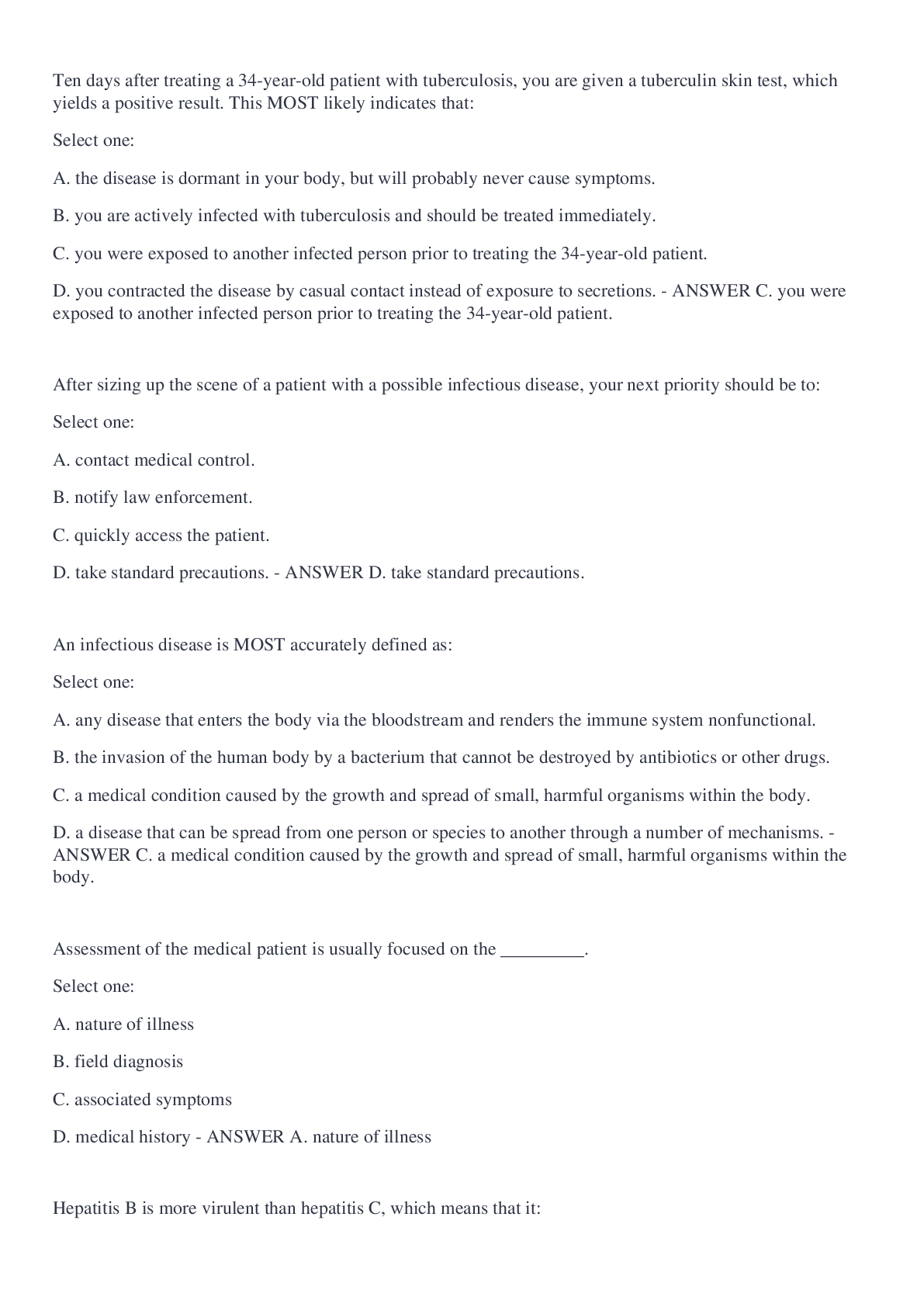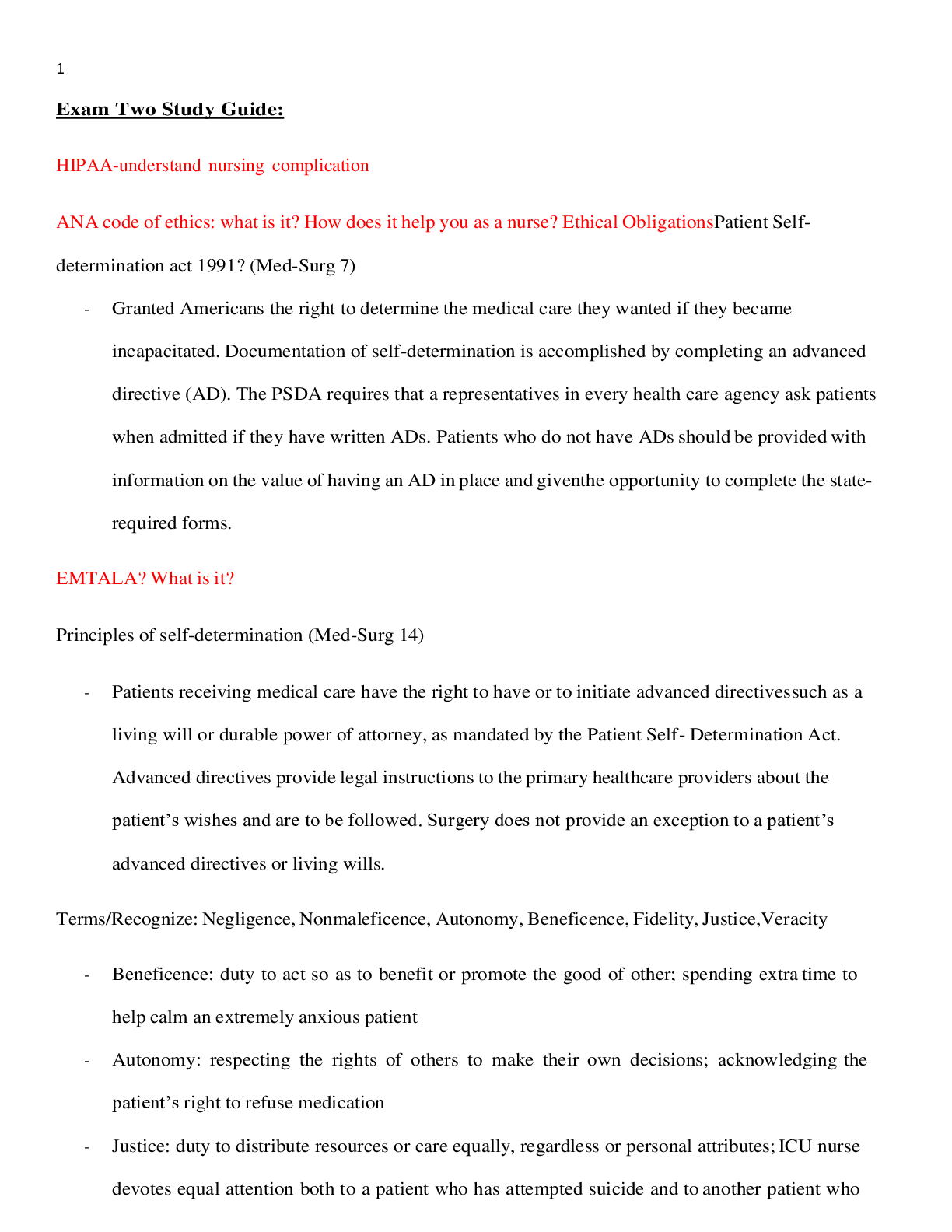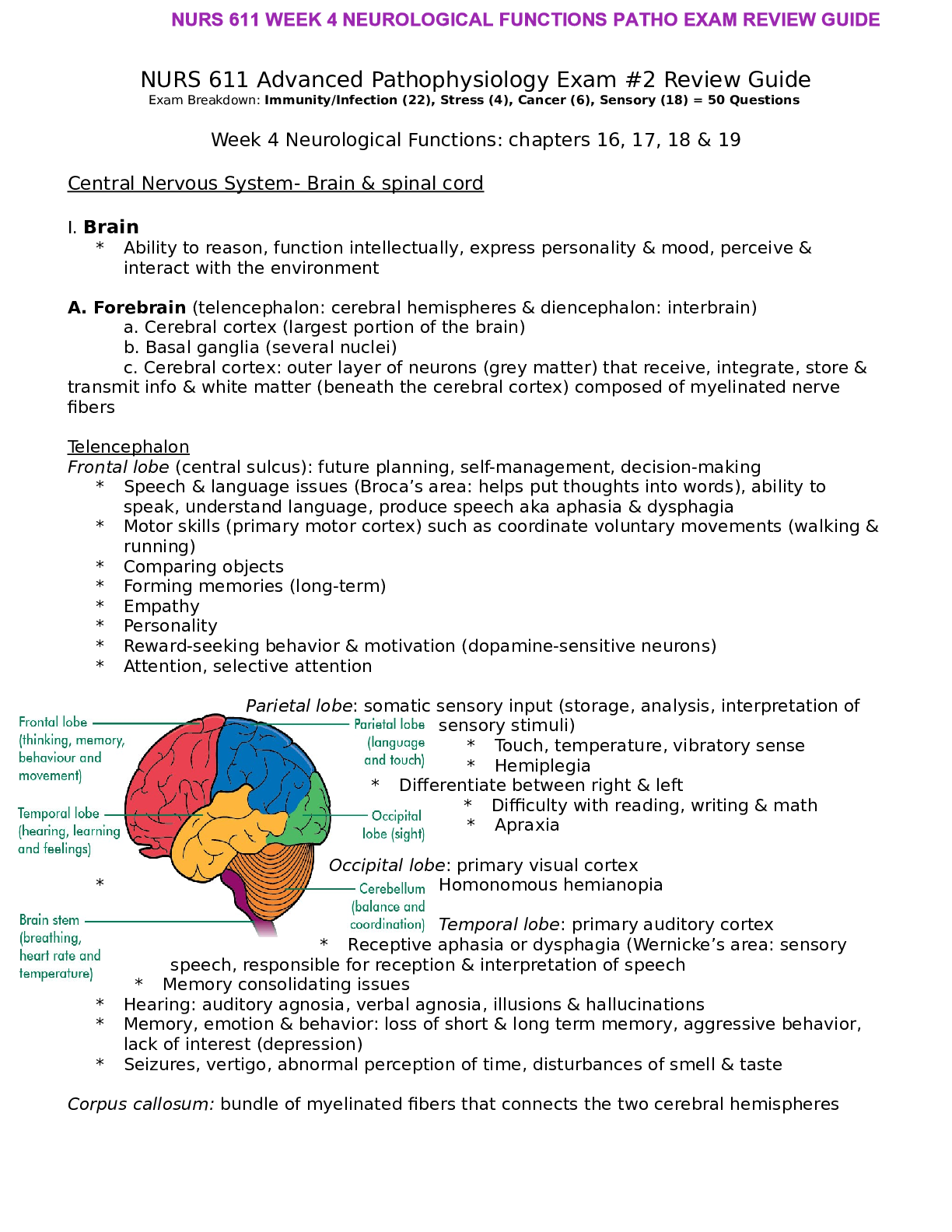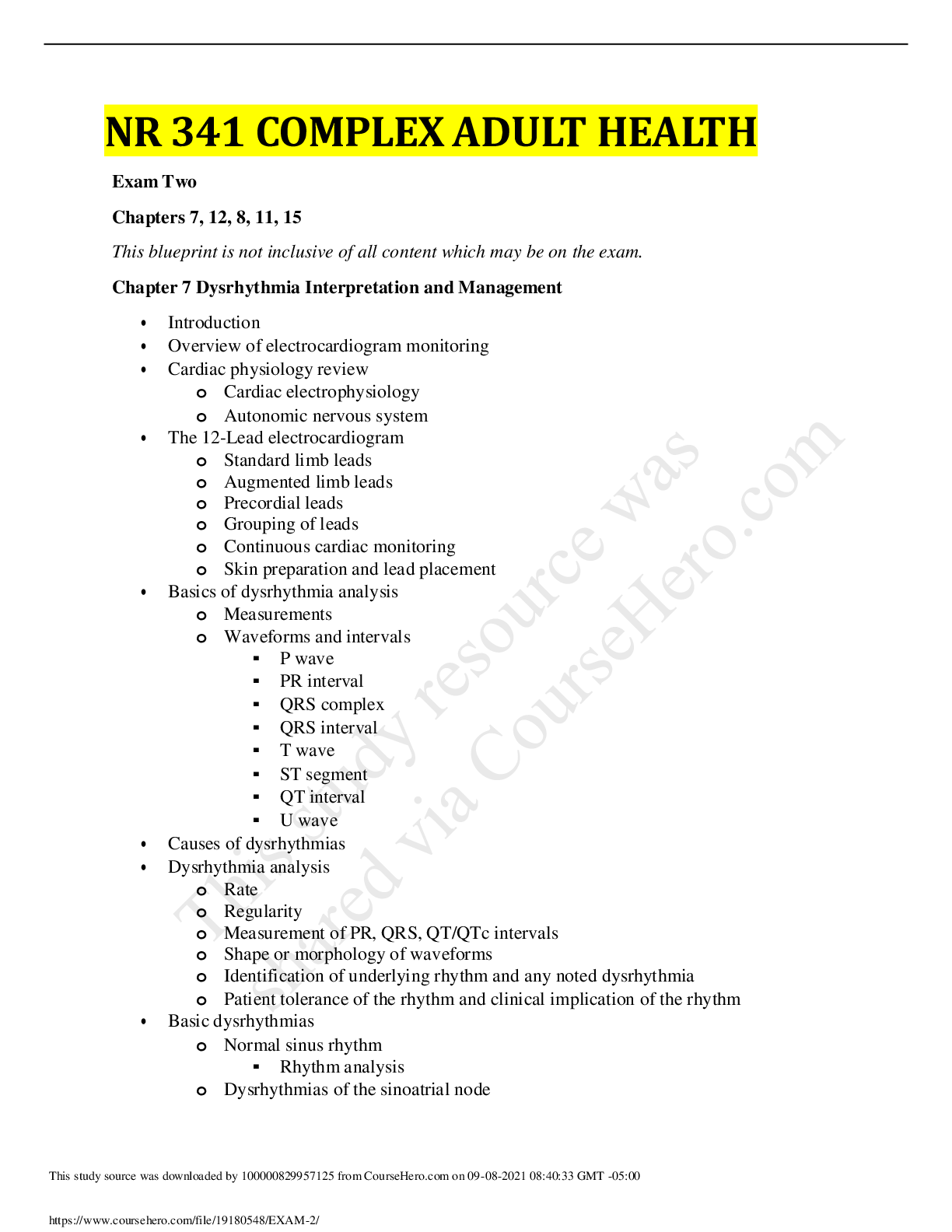Physiology > STUDY GUIDE > NAADAC Module Two Study Guide Updated Version 2022/2023 Graded A+ (All)
NAADAC Module Two Study Guide Updated Version 2022/2023 Graded A+
Document Content and Description Below
*What is classical conditioning? - ANSWER *Think Pavlov's dog*, where a particular response to a stimuli can be elicited over time by association with another related stimuli, like ringing of the bell... when food is given to the dog. Behavior Therapy *Operant Conditioning* - ANSWER Think BF Skinner and his little girl, where behavior is reinforced and learned based on the consequences of the behavior. Behavior Therapy *Social Learning Approach* - ANSWER Think the post toasties cereal joke - A method of behavior therapy developed by Albert Bandura where *behavior is learned by observing the consequences of someone else's experience. Behavior Therapy *How is it applied? - ANSWER Tokens for sobriety i.e. AA Chips Cue Exposure Treatment Aversion Therapy i.e. Antabuse - Schick Shadel Cognitive Behavior Therapy *What is the basis? - ANSWER An method of counseling that focuses on simultaneously learning new behaviors and restructuring automatic thoughts, Cognitive Behavior Therapy *Where it does not work well* - ANSWER For the client who is unwilling to be engaged in therapy and do the homework. Dialectical Behavior Therapy (DBT) *History and Original Intent* - ANSWER Modified form of CBT originally designed to treat suicide patients who meet the diagnosis for *borderline personality disorder*. Dialectical Behavior Therapy (DBT) *What else is DBT used for? - ANSWER Shown empirically to be useful for substance dependence, depression, post- traumatic stress disorder (PTSD) and eating disorders. Dialectical Behavior Therapy (DBT) *Main Principal* - ANSWER *Mindfulness* - Essential and core skill *Interpersonal Effectiveness* - Similar to assertiveness training *Distress Tolerance* - This involves accepting, finding meaning for, and tolerating distress *Emotional Regulation* - Learning to regulate emotions Family Systems Counseling *Six Basic Family Roles* - ANSWER *Substance Abuser* *Enabler* *Hero* *Scapegoat* *Lost Child* *Mascot* - Most likely to commit suicide Family Systems Counseling *Common Family Approaches* - ANSWER *Bowenian Family Therapy* triangulation, genograms *Experiential/Humanistic Family Therapy* Focuses on the present, promoting choice, self-determination and actualization *Family Disease Model* Family disease *Structural Family Therapy* enmeshment - boundaries *Strategic Family Therapy* directives Gestalt Therapy *Basis* - ANSWER A method of countering where a client gains awareness of his or her behavior and learns how to accept personal responsibility for those behaviors Gestalt Therapy *Key Aspects* - ANSWER *Genuineness* must occur between the client and the therapist *Projective Therapy* Think empty chair approach Gestalt Therapy *Other Key Tenets* - ANSWER *Existentialism* focuses on present day and stresses personal responsibility for one's own destiny *Unfinished Business* Unexpressed feelings from childhood that now interfere with healthy functioning *Contact* process of interacting with nature and with other people without losing one's sense of individuality Medication Assisted Treatment *Basis* - ANSWER The use of prescriptions to assist and support a client's ongoing counseling and recovery Medication Assisted Treatment *Types* - ANSWER *Sensitizers* Overly sensitizes Antabuse *Antagonists* Block the effects Naltrexone *Opioid Inverse Agonist* both opioid-like properties and can also be a blocker of opioids Buprenorphine *Psychotropics* dual diagnosis anti-depressants Person Centered Therapy *Basis* - ANSWER The client, not the counselor directs the course of the treatment process Person Centered Therapy *Main Principals* - ANSWER *Humanism: * A philosophical movement that focuses on the innate nature within all humans to achieve our potential and find meaning in our lives *Congruence: * This is the most important of the three attitudes. lt is a condition where the counselor is consistently *genuine or real*, the counselor is able to match his or her external behavior with inner thoughts and feelings *Unconditional Positive Regard: * A component of person- centered therapy where a counselor shows the client constant acceptance and caring. *Accurate Empathic Understanding: * The ability to identify with and understand the subjective world of a client; also, a component of person-centered therapy Psychoanalytical Theory *Basis* - ANSWER A *deterministic method* of counseling where the mental dysfunction results from a client's internal conflicts, processes and memories. Psychoanalytical Theory *Key Principles* - ANSWER *Unconscious Mind: * A part of the human psyche that functions outside of the awareness of the individual *Analysis of Resistance: * A component of psychoanalytical therapy where a client surfaces repressed material from the unconscious mind up to the conscious mind, *ld.: A component of psychoanalytical therapy that is the source of unconscious aggressive and sexual urges *Ego: * A component of psychoanalytical therapy that is the mediator between the id and superego *Super Ego: * A component of psychoanalytical therapy that is the source of moral urges *Defense Mechanism: * A technique employed by the ego when a conflict between the superego and id causes anxiety, according to psychoanalytical therapy Rational-emotive; behavior Therapy (REBT) *Basis* - ANSWER A method of counseling that focuses on changing the problematic beliefs ol an individual as a result of the events in his or her life Rational-emotive; behavior Therapy (REBT) *Key Principal* - ANSWER *Activating Events: * According to rational-emotive- behavior therapy, they are events that occur in an individual's life that lead to a reaction (belief) about that event, *Beliefs: * How a person feels or thinks about an activating event; a component of rational-emotive-behavior therapy. *Consequences: * How an individual behaves based on his or her beliefs concerning an activating event; a component of rational-emotive-behavior therapy Rational-emotive; behavior Therapy (REBT) *The A-B-C Theory* - ANSWER ABC Model of REBT *A* = Activating Event *B* = Beliefs *C* = Emotional and Behavioral Consequences ln therapy, the therapist also introduces *D (disputing intervention)*, *E (the effect of D)*, and *F (the new feeling that results from E)*. Reality Therapy/Control Theory *Basis* - ANSWER A method of counseling that focuses on how a client perceives the external world and the behaviors he or she exhibits to fit those perceptions and needs. Reality Therapy/Control Theory *Central Question of Reality Therapy* - ANSWER ls what you are choosing to do getting you what you want? Reality Therapy/Control Theory *Key Principal" - ANSWER *Success Identity:* A component of reality therapy/control theory where a person feels he or she has seltworth, is powerful, and is able to love and be Reality Therapy/Control Theory *Total Behavior* - ANSWER Doing Thinking Feeling Physiology Reality Therapy/Control Theory *Eight Basic Principles* - ANSWER 1) develop a therapeutic relationship 2) focus on the client's current behavior 3) ask the client to evaluate the behavior 4) develop plans for change; 5) get a commitment from the client 6) do not accept any excuses 7) do not use punishment 8) never give up on the client Solution-Focused Therapy *Basis* - ANSWER What is possible in developing solutions, rather than attempting to understand the problem. Solution-Focused Therapy *Key Principle* - ANSWER *Utilization:* A component sf solution- focused therapy where the counselor helps the client utilize previous successes to motivate change Addiction Counseling Practices *Evaluation* - ANSWER A systematic and ongoing process in which a relationship is initially formed with the evaluating counselor in the initiation of a two-phase process: *Screening* and *Assessment* Addiction Counseling Practices *Screening* - ANSWER The first phase of evaluation where the potential client is briefly interviewed to determine if he or she is appropriate for that specific facility [Show More]
Last updated: 1 year ago
Preview 1 out of 22 pages
Instant download
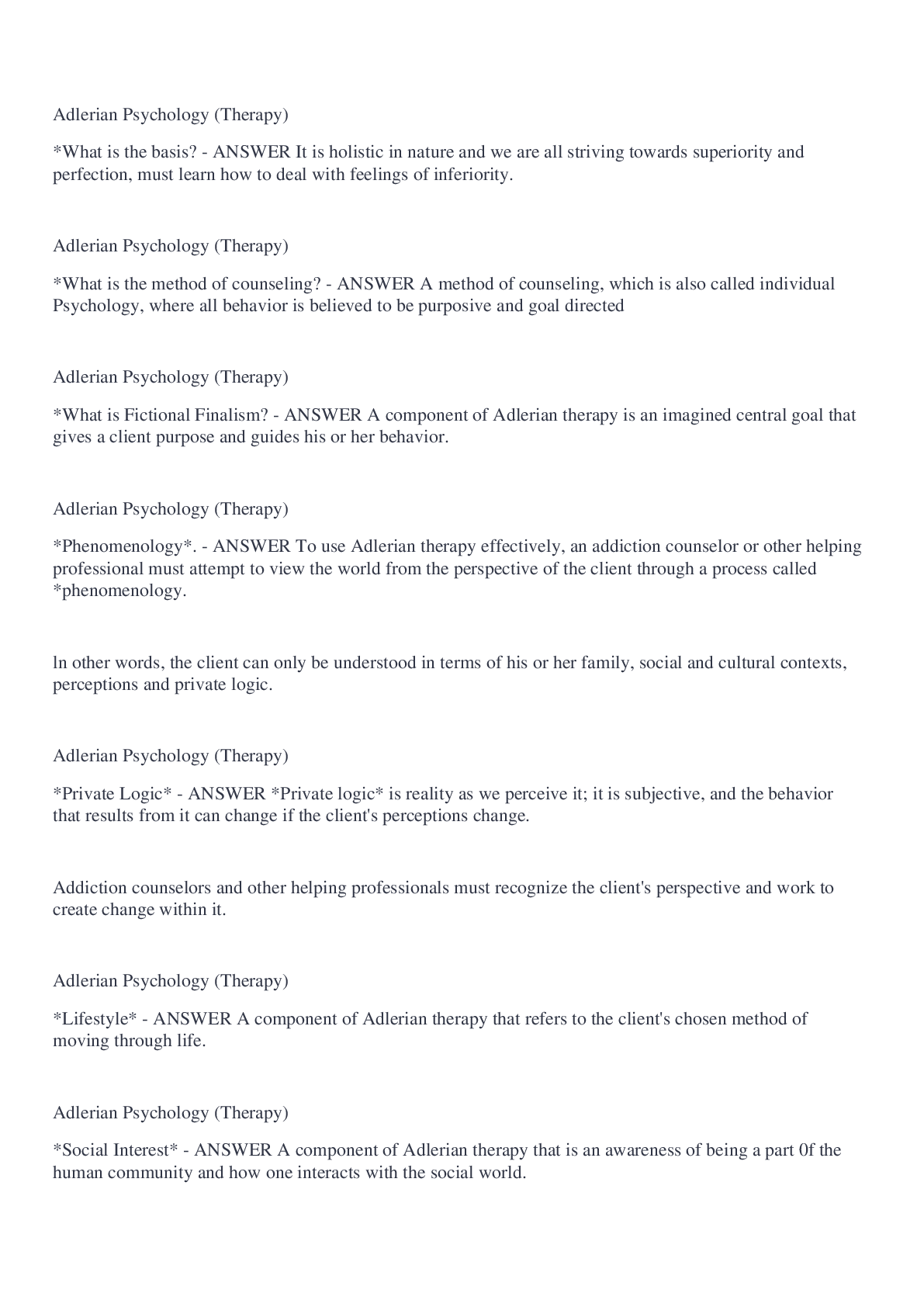
Buy this document to get the full access instantly
Instant Download Access after purchase
Add to cartInstant download
Reviews( 0 )
Document information
Connected school, study & course
About the document
Uploaded On
Aug 12, 2022
Number of pages
22
Written in
Additional information
This document has been written for:
Uploaded
Aug 12, 2022
Downloads
0
Views
58

